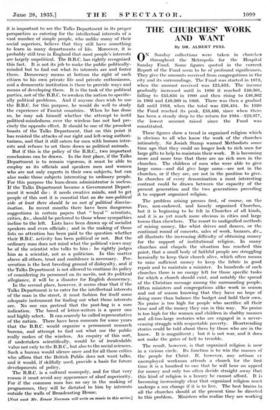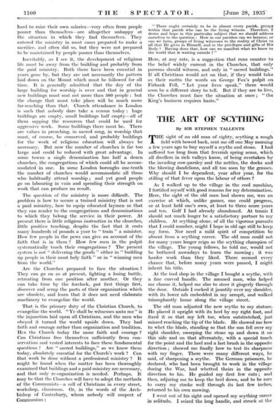THE CHURCHES' WORK AND WANT
By DR. ALBERT PEEL ON Sunday collections were taken in churches throughout the Metropolis for the Hospital Sunday Fund. Some figures quoted in the current Report of the Fund seem to be of profound significance. They give the amounts received from congregations in the city and its surroundings. The Fund was started in 1873, when the amount received was £25,855. The income gradually increased until in 1896 it reached £40,501, falling to £35,856 in 1900 and then rising to £46,362 in 1902 and £49,209 in 1903. There was then a gradual fall until 1913, when the total was £28,434. In 1920 the Fund reached its peak, £53,486, since when there has been a steady drop to the return for 1934-123,977, the lowest amount raised since the Fund was constituted.
These figures show a trend in organized religion which is obvious to all who know the work of the churches intimately. Sir Josiah Stamp warned Methodists some time ago that they could no longer look to rich men for large gifts to help to maintain their work. It is becoming more and more true that there are no rich men in the churches. The children of men who were able to give large sums—and did give large sums—are not in the churches, or if they are, are not in the position to give. In churches of every denomination a most interesting contrast could be drawn between the capacity of the present generation and the two generations preceding it to support organized religion.
The problem arising presses first, of course, on the Free, non-endowed, and 'loosely organized Churches, but it is beginning to be felt in Churches of all kinds, and it is as yet much more obvious in cities and large towns than elsewhere. The resort to undignified methods of raising money, like whist drives and dances, or the continual round of concerts, sales of work, bazaars, &c., all illustrate the increasing difficulty of obtaining money for the support of institutional religion. In many churches and chapels the situation has reached this point, that a small body of faithful people are struggling heroically to keep their church alive, which often means to raise sufficient money to keep the fabric in good repair and to maintain a minister. In hundreds of such churches there is no energy left for those specific tasks for which a church should exist, and notably the spread of the Christian message among the surrounding people. Often ministers and congregations alike work in season and out of season knowing that they have no hope of doing more than balance the budget and hold their own. No praise is too high for people who sacrifice all their time and all the money they can in this way. No praise is too high for the women and children in shabby manses and all-too-large rectories who are engaged in a never- ceasing struggle with respectable poverty. Heartrending stories could be told about them by those who are in the know. It is magnificent ; but it is not war, and it does not make the gates of hell to tremble.
The result, however, is that organized religion is now in a vicious circle. Its function is to win the masses of the people for Christ. If, however, any artisan c t unemployed workman attends a church for the first time it is a hundred to one that he will hear an appeal for money and only too often decide straight away that this kind of religion is a luxury he cannot afford. It is becoming increasingly clear that organized religion must undergo a sea change if it is to live. The best brains in all the churches should at the present time be directed to this problem. Ministers who realize they are working hard to raise their own salaries—very often from people poorer than themselves—are altogether unhappy at the situation in which they find themselves. They entered the ministry in most cases prepared to make a sacrifice, and often did so, but they were not prepared to be maintained by people poorer than themselves.
Inevitably, as I see it, the development of religious life must be away from the building and probably from the paid ministry. Both these have been essential in years gone by, but they are not necessarily the pattern laid down on the Mount which must be followed for all time. It is generally admitted that the day of the large building for worship is over and that in general new buildings must seat not more than 500 people : but the change that must take place will be much more far-reaching than that. Church attendance in London is such that nobody dare take a census today : huge buildings are empty, small buildings half empty—all of them sapping the resources that could be used for aggressive work. Some buildings there must be. There are values in preaching, in sacred song, in worship that must, of course, be conserved, and probably buildings for the work of religious education will always be necessary. But now the number of churches is far too large and could be reduced with great advantage. In some towns a single denomination has half a dozen churches, the congregations of which could all be accom- modated in one. In some London boroughs one-tenth the number of churches would accommodate all those who habitually attend worship ; and yet good people go on labouring in vain and spending their strength on work that can produce no result.
The question of the ministry is more difficult. The problem is how to secure a trained ministry that is not a paid ministry, how to equip educated laymen .so that they can render to the congregations and denominations to which they belong the service in their power. At present there is little religious instruction in the churches, little positive teaching, despite the fact that it costs many hundreds of pounds a year to " train " a minister. How few people in the pews can give an account of the faith that is in them ? How few men in the pulpit systematically teach their congregations ? The present system is not " delivering the goods " either in " building up people in their most holy faith " or in " winning men from the world."
Are the Churches prepared to face the situation ? They can go on as at present, fighting a losing battle, retreating from one position after another. Or they can take time by the forelock, put first things first, discover and scrap the parts of their organization which • are obsolete, and learn that it does not need elaborate machinery to evangelize the world.
• That is the primary duty of the Christian Church, to evangelize the world. "Ye shall be witnesses unto me" is the injunction laid upon all Christians, and the men who obeyed it turned the world upside down. They had faith and courage rather than organization and tradition. Hes the Church today the same faith and courage ? -Can Christians free themselves sufficiently from con- servatism and vested interests to face these fundamental -questions ? Are " sacred buildings," as we know them today, absolutely- essential for the Church's work ? Can that work be done without a professional ministry ? It might be found when the matter has been thoroughly examined that buildings and a paid ministry are necessary, and that only re-organization is needed. Perhaps. It may be that the Churches will have to adopt the methods of the Communists—a cell of Christians in every street, -workshop, classroom. Or, in the words of the Arch- bishop of Canterbury, whom nobody will suspect of Communism ;
. " There ought certainly, to be in almost every parkas, groups, within that parish who can be the living witness. Therefore, I desire and hope in this particular subject that we should address ourselves to the question : How in our parishes can we become, or can we form, groups of living witnesses to the reality of Christ to all that He gives in Himself, and in the privileges and gifts of His Body - Having done that, haw can we manifest what we know to the world that is waiting outside ? "
Here, at any rate, is a suggestion that runs counter to the belief widely current in the Churches, that only parsons should witness, and only in " sacred buildings." If all Christians would act on that, if they would take as their motto the words on George Fox's pulpit on Firbank Fell, " Let your lives speak," there would soon he a different •story to tell. But if they are to live, the Churches must face the situation at once ; " the King's business requires haste."







































 Previous page
Previous page